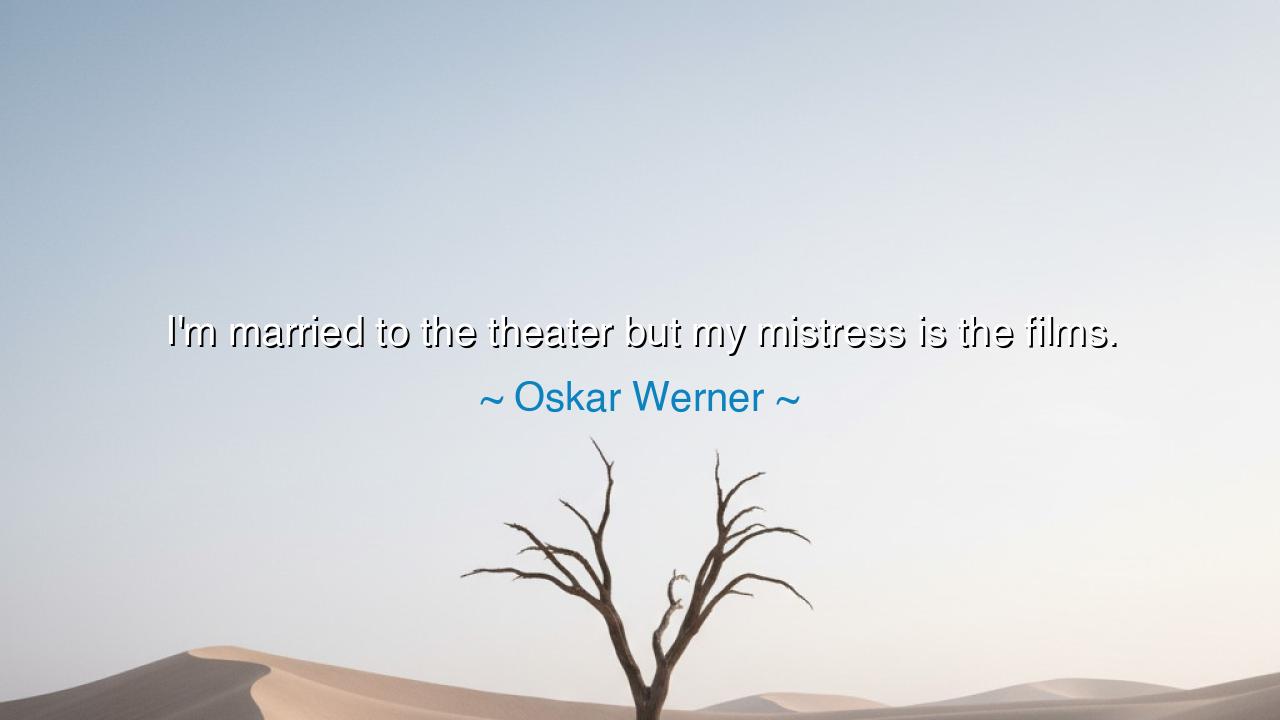
I'm married to the theater but my mistress is the films.






Listen well, O children of the future, for the words of Oskar Werner carry deep meaning about the tension between commitment and passion: "I'm married to the theater but my mistress is the films." These words reveal the eternal struggle between the devotion to one’s true calling and the allure of something that draws the soul in unexpected ways. Werner’s marriage to the theater speaks to his unwavering dedication to the stage, the place where his craft began and where the foundation of his artistry was laid. But the mistress—the films—represents a more modern, captivating force that pulls him away, tempting him with new possibilities, new challenges, and new ways of expressing his art. This tension between the two, like a man torn between loyalty and desire, reveals something deeply human about the nature of artistic pursuit.
In the ancient world, O children, the great heroes and artists often found themselves caught between conflicting paths. Hercules, the mighty hero of Greek mythology, was tasked with completing his twelve labors, yet he was also driven by an inner restlessness—a longing for greater meaning and understanding. Just as Hercules struggled to reconcile his duties with his desires, so too does Werner’s quote reflect the artist’s conflict between commitment to a familiar, foundational craft and the temptation of a new, more sensational world. The theater, like Hercules' trials, was the arena of dedication, where every performance demanded full devotion, but the films—like a mistress—offered a new world, one that promised both escape and exhilaration.
Theater, O children, has long been seen as the purest form of art, for it requires the artist to give their whole self to the audience, to stand exposed, relying on nothing but the power of words and the emotion of the performance. The stage is where actors create a world with only the human voice, the movement of the body, and the energy shared between them and the audience. To be married to the theater is to dedicate oneself to the living, breathing form of art, where each performance is unique and unrepeatable. Just as Sophocles and Euripides gave their souls to the stage, so too did Werner devote himself to the world of the theater. Yet, like all great artists, his soul yearned for the allure of the film—a medium that, though different, also offered the power to touch the hearts and minds of audiences.
Consider, O children, the story of William Shakespeare, whose works were meant to be performed, not read. His plays, from the tragedy of Macbeth to the comedy of A Midsummer Night’s Dream, were not merely literary works, but living pieces of theater that demanded to be enacted in front of an audience. Yet, the genius of his writing transcended the stage and lived on long after the curtain fell. Even now, Shakespeare’s plays are adapted into films, proving that the power of theater can transcend time and be reborn in new forms. This tension between the written word and the visual spectacle mirrors the conflict in Werner’s words, where the stage (the realm of the actor’s deepest craft) is but one aspect of the broader creative journey, and the film (a visual and cinematic language) is a new arena to explore the depths of expression.
Werner’s quote speaks not only to an actor’s inner conflict but also to the larger human struggle between duty and desire. The ancient warriors—such as Achilles, whose commitment to battle was as strong as his yearning for peace—faced a similar tension. Achilles’ heart was torn between his loyalty to his comrades and his own longing for a life of tranquility. But he knew that a warrior’s duty was to the battlefield, even if it meant sacrificing his peace. In the same way, Werner’s devotion to the theater represents the loyalty to the craft that shaped him, while his desire for the films represents the pull of something new and exciting. In both cases, the heart must navigate between what is known and what calls to it from beyond.
The lesson, O children, lies in understanding that the pursuit of art—whether on the stage, on the page, or in the realm of film—is a journey of commitment and transformation. True artists are those who do not merely follow the path they are on, but who are willing to embrace the new and transformative experiences that life presents. Just as Werner embraced the world of cinema without abandoning his roots in theater, so too must you find ways to honor your passions and loyalties while remaining open to the new possibilities that come your way. The tension between the familiar and the unknown can be the fuel that propels you toward greater creativity and understanding.
And so, O children, let this wisdom guide you: In your own lives, you may find yourselves torn between what you have always known and what calls you to something new. Honor your commitments, but also recognize that growth comes from embracing new challenges and experiences. Like Oskar Werner, who embraced both the stage and the screen, you too can find a way to live in the tension between duty and desire, between the known and the new. Through this balance, you will not only find fulfillment, but also create a life that is rich in possibility, where every step forward is a step towards discovering more of your true self.






AAdministratorAdministrator
Welcome, honored guests. Please leave a comment, we will respond soon